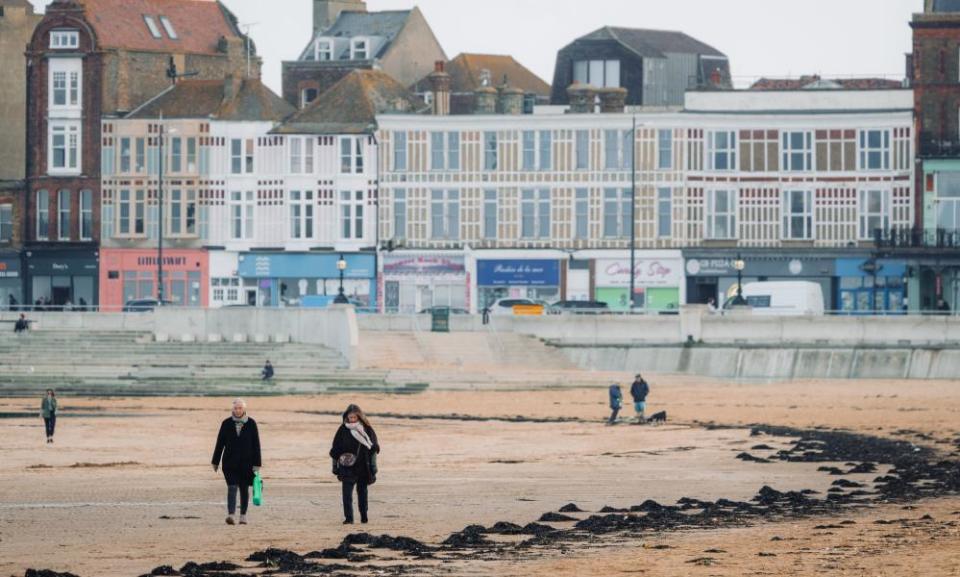Dreamland by Rosa Rankin-Gee review – first love and rising tides

Rosa Rankin-Gee’s first novel, The Last Kings of Sark, explored the fraught emotional fallout of an idyllic summer in which three young people run wild together on the small Channel island. While two of the trio are quick to move on from the experience, Jude finds herself mired in the past, unable to let go.
Keenly attuned once again to the heady sensations of those caught between adolescence and adulthood, Rankin-Gee’s second novel, Dreamland, is an equally enthralling coming-of-age story. But whereas in The Last Kings of Sark her characters retreated from the wider world, no such respite is possible here. Jude was mourning the end of something almost impossibly intimate, but Dreamland faces up to much broader, collective losses in the story of 16-year-old Chance, discovering life and love while all around her the world is crumbling.
To call the novel dystopian is perhaps a stretch, not least because socio-political and ecological collapse seem to creep closer every day, making it harder to separate speculative conjectures from the myriad disorders of the present. Instead, Dreamland is set in an instantly recognisable near-future Britain just a few degrees removed from our own: think Russell T Davies’s Years and Years.
We are in the once refined but now rundown seaside town of Margate. This is an area already steeped in a strange, singular psychology, slightly out of step with the rest of the country. David Seabrook’s 2002 All the Devils Are Here depicted Kent’s coast as both a bolthole and a blind alley for a motley, menacing band of eccentrics. “Planet Thanet” is how Chance explains their environs to an outsider; an increasingly isolated ecosystem in decline.
Across the entire country, heatwaves are becoming more relentless, but Margate also has to contend with the immediate issue of rising sea levels. At high tide the streets are flooded, evidence of the ocean’s ingress left behind when it retreats again. The dank lobby of a high-rise block is strewn with debris from the deep: “mountains of damp sand. Broken shells and rubbish, all the colours faded. Seaweed.” “Who needs Thailand, eh?” jokes Chance. “We got all the sun, sand and tsunamis you could want right here.”
Related: Rosa Rankin-Gee's top 10 novellas about love
This may not be Britain as we know it, but much of what’s described has been put in motion already – not just the climate crisis, but government policies displacing social tenants. “London was too expensive to be the future,” Chance’s mum explains to her and her brother JD when, in the backstory at the beginning of the novel, a non-government-run organisation offers them cash to relocate to the coast. London is “a hotbed, a bomb waiting to go off. That, and an island for rich Russians.” In recent years Margate has already welcomed plenty of homegrown refugees.
Despite her high hopes, the fresh start Chance’s mother dreams of never quite materialises. She, like so many others, struggles to find work, and anger towards a government that’s all but abandoned them begins to fester among the town’s residents. In the ever-widening gap between the haves and the have-nots, those with the resources to do so have long since fled; the only people left are the ones with nowhere else to go. When Chance falls in love with Franky, a middle-class Londoner volunteering with a humanitarian project that runs food banks for the struggling local community – do-gooding gap-year students are like cockroaches, it seems, still standing even at the end of the world – the possibility of a different kind of life opens up. Little does she know, however, that she and Franky are caught up in something much bigger than themselves.
Although Rankin-Gee’s nuanced, astute world building deserves applause, it’s this relationship that holds the novel together, in large part because it feels so real. She vividly captures the balance between ferocity and vulnerability as the two girls explore their burgeoning desire; one minute they’re greedy for each other, the next they’re proceeding more gingerly. Theirs is a great first love, blazing bright and furious amid the poverty and the pain, the perfect counterweight that’s needed to make the novel sing. Dreamland brings us face-to-face with much of what we’re on the threshold of losing; nevertheless, it manages to convince us that its characters have everything still to live for.
• Dreamland by Rosa Rankin-Gee is published by Scribner (£14.99). To order a copy go to guardianbookshop.com. Delivery charges may apply.

 Yahoo Finance
Yahoo Finance 